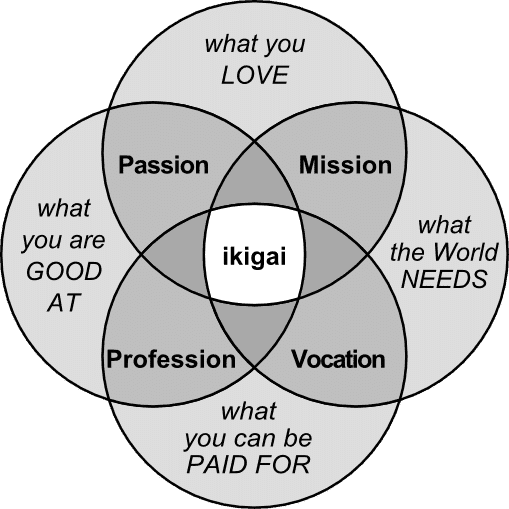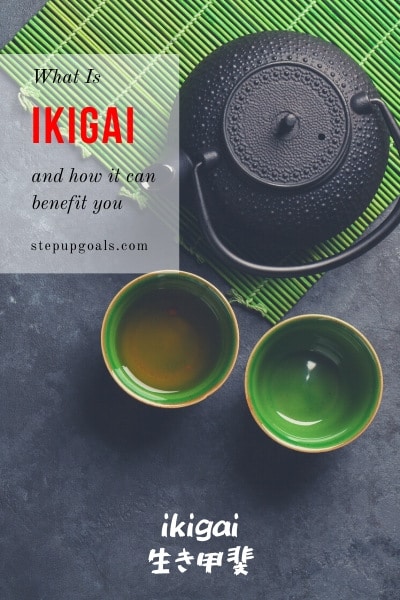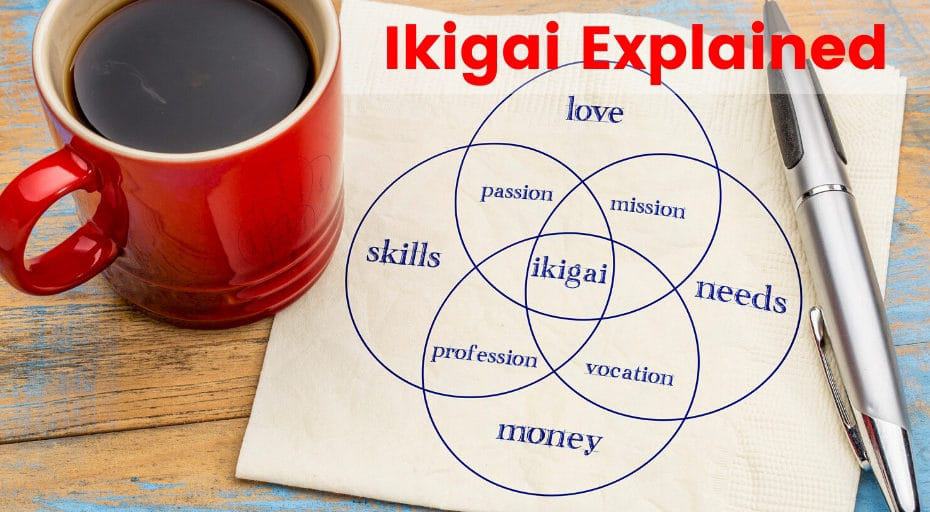What Is Ikigai?
Ikigai is a Japanese concept that is written as 生き甲斐 and is translated as “a reason for being” or “the happiness of always being busy”. The term ikigai compounds two Japanese words: iki (生き) meaning “life” and kai (甲斐) meaning “to be worthwhile”.
We are what we repeatedly do. Excellence, then, is not an act but a habit.
Aristotle
I got sucked into ikigai when my beautiful wife bought me a book by Héctor García and Francesc Miralles called “Ikigai: The Japanese Secret to a Long and Happy Life”. You might have noticed that the author’s names aren’t really Japanese sounding and you are right.
Héctor García is originally from Spain but is a Japanese citizen where he has lived for more than a decade and authored several bestsellers. Francesc Miralles is an award-winning bestselling author as well.
Together they ventured to the Japanese island of Okinawa. In Okinawa, the number of centenarians (people older than 100 years) in relation to the total population was, in September 2010, 92% higher than the national average.
Okinawa is the smallest and least populated of the five main islands of Japan and has a total population of around 1.3 million people. Okinawans are among the longest-living peoples in the world. Okinawans have less cancer, heart disease and dementia than residents in other parts of the world, while Okinawan women live longer than anywhere else on Earth.
They conducted an interview with a hundred people, asking the eldest members of the community about their life philosophy, their ikigai and their secrets to longevity. Here are the most inspiring statements from some of the oldest people in the world.
Wise Words From Some Of The Oldest People In The World
Don’t worry
“The secret to a long life is not to worry. And to keep your heart young. Don’t let it grow old. Open your heart to people with a nice smile on your face. If you smile and open your heart, your grandchildren and everyone else will want to see you.”
“Here, everyone gets along. We try not to cause problems. Spending time together and having fun is the only thing that matters.”
Have good habits
“The key to staying sharp in old age is in your fingers. From your fingers to your brain, and back again. If you keep your fingers busy, you’ll live to see one hundred.”
I do exercise every day, and every morning I go for a little walk.”
“Working. If you don’t work, your body breaks down.”
Nurture your friendships every day
My main hobby is getting together with friends and neighbors.”
“Talking each day with the people you love, that’s the secret to a long life.”
“Chatting and drinking tea with my neighbors. That’s the best thing in life. And singing together.”
Live an unhurried life
“Doing many different things every day. Always staying busy, but doing one thing at a time, without getting overwhelmed.”
The secret to long life is going to bed early, waking up early, and going for a walk. Living peacefully and enjoying the little things. Getting along with your friends. Spring, Summer, Fall, Winter…enjoying each season happily.”
Be optimistic
“Every day I say to myself, ‘Today will be full of health and energy. Live it to the fullest.'”
How To Find Your Ikigai
Ask yourself these questions to find your ikigai:
- What do you enjoy doing something so much that you forget about whatever worries you might have while you’re doing it?
- When are you happiest?

Find Your Purpose
Finding your purpose in life is the basic principle of ikigai. As you can see in the diagram above, ikigai is at the intersection of your passion, mission, profession, and vocation. You will find your ikigai in the middle of what you love but are also good at. But you can also be paid for it and is a necessary thing.
Existential frustration arises when our life is without purpose, or when our purpose is skewed. This frustration doesn’t have to be a bad thing – in fact, it can be a catalyst for change.
Discovering one’s purpose in life can help fill that existential void.
Once you find your ikigai, your main goal is to keep at it and continue to stay on the right path.
Find Your Flow
Time flies when you’re having fun!
You’ve probably heard this a hundred times already. Our perception of time is funny that way. I still remember when Data, the android from Star Trek, boiled the same amount of water in a kettle 62 times to test the aphorism, ‘a watched pot never boils’. Of course, it always reached its boiling point in precisely 51.7 seconds.
Menial tasks always seem to drag forever and fun and engaging ones seem to fly. Psychologist Mihaly Csikszentmihalyi researched the experience of being completely immersed in what we’re doing and called it “flow”.
You should focus on increasing the time you spend on activities that bring you to this state of flow in contrast to spending time on activities that offer immediate pleasure.
Most athletes, chess players, engineers, et cetera spend much of their time doing activities that bring them in the flow state.
“Put your hand on a hot stove for a minute and it seems like an hour. Sit with a pretty girl for an hour, and it seems like a minute.”
Albert Einstein
If you often find yourself losing focus while working on something important, you can use these next few strategies to help you achieve the flow.
- Choose a difficult (but not too difficult) task
| Easy | Challenging | Beyond Your Abilities |
| Boredom | Flow | Anxiety |
- Have a clear objective
Have a clearly defined objective and focus on the process.
- Choose ONE task and stick with it
Don’t let yourself get distracted by other things.
Conclusion
I’ve kept this Ikigai post rather short as it is a simple concept to grasp. Finding your ikigai might prove to be a bit more difficult. You’ll have to do a fair bit of soul searching to find the real reason to get out of bed in the morning. What are the interests that you could monetize and help others in the process? Read how I broaden my horizons in this post and learn how you could find your ikigai faster.
The Ten Rules Of Ikigai
These 10 rules of ikigai were distilled by the authors from the wisdom of some of the longest living people on the planet that live in Ogimi, Okinawa.
- Stay active; don’t retire
- Take it slow
- Don’t fill your stomach (only eat till 80% full)
- Have good friends
- Get in shape
- Smile
- Reconnect with nature
- Give thanks
- Live in the moment
- Follow your ikigai
Ikigai Quotes
“Essentials to happiness in this life are something to do, something to love, and something to hope for.”
― Ikigai: The Japanese Secret to a Long and Happy Life
” It is much more important to have a compass pointing to a concrete objective than to have a map. ”
― Ikigai: The Japanese Secret to a Long and Happy Life
“There is no future, no past. There is only the present.”
― Ikigai: The Japanese Secret to a Long and Happy Life
“Concentrating on one thing at a time may be the single most important factor in achieving flow.”
― Ikigai: The Japanese Secret to a Long and Happy Life
“Life is not a problem to be solved. Just remember to have something that keeps you busy doing what you love while being surrounded by the people who love you.”
― Ikigai: The Japanese Secret to a Long and Happy Life
“Only staying active will make you want to live a hundred years”
― Japanese proverb
“What you love to do, you will learn to do well.”
― Japanese Proverb
“A jewel will not shine if it is not polished.”
― Japanese proverb
“Concentrate on the first steps rather than the entire journey.”~”
― Japanese Proverb
“What you don’t sweat out when you’re young will turn into tears when you’re old.”
― Japanese Proverb
“Life without endeavor is like entering a jewel mine and coming out with empty hands.”
― Japanese Proverb
Sources:
- “Ikigai: The Japanese Secret to a Long and Happy Life” by Héctor García and Francesc Miralles – find this great book on Amazon or read the main points in Blinkist in 15 minutes
- Wikipedia




